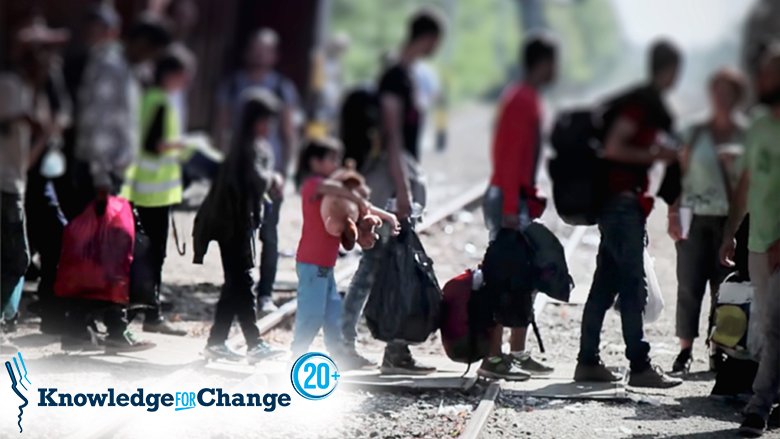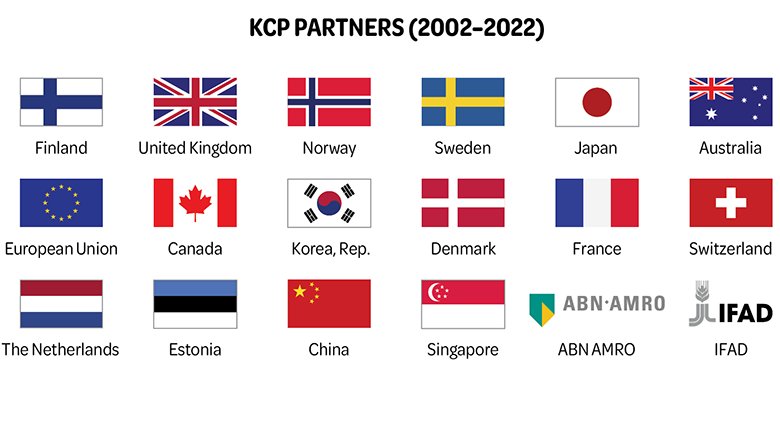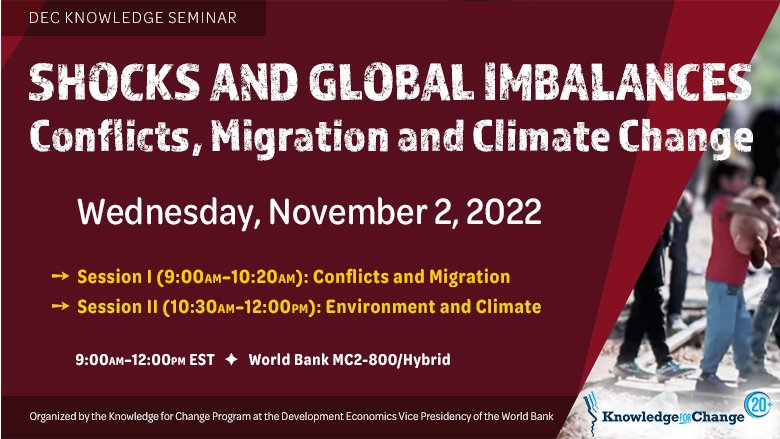About the KCP 20+: The Knowledge for Change Program’s 20th anniversary celebration (“KCP20+”), to be implemented through a series of events, will serve as dialogues on knowledge generation in international development that cross sectors, generations, and borders. A total of three events will take place between the fall of 2022 and spring of 2023 on the following topics: conflicts and migration; environment and climate; poverty and inequality; human capital and development; trade and international integration; and private sector development

The first KCP 20+ event will take place on Wednesday, November 2, and focus on two themes: i) conflicts and migration, and ii) climate and environment.
A complex web of forces — shocks, stresses, and imbalances — influences migration, environmental shifts, and climate change. Issues related to migration and climate change both involve the discussion of long-term forces, such as global inequalities and geographic differences, as well as sudden, short-term shocks, such as war, conflicts, or natural disasters. The optimal management of the dual nature of these issues remains a persistent analytical and policy puzzle. Most recently, climate-induced migration further exacerbates development concerns, as extreme weather events, droughts, water shortages, and sea-level rises intensify migratory pressures and amplify the magnitude of internal and cross-border mobility. How to better design policies that protect the most vulnerable populations who face the impacts of multiple shocks simultaneously also deserves much more in-depth discussions.
This 3-hour hybrid event will mainly be divided into two parts of discussions on the themes of i) Part I: conflicts and migration, and ii) Part II: environment and climate. Both Parts of the event will open with a presentation on the evolution of research and knowledge in the respective topic areas by DEC representatives. A panel discussion will follow, featuring diverse perspectives from stakeholder groups such as academia, WBG operations, governments, international organizations, and non-state actors. Given the connections of the two topics, the panelists would also be asked to comment on issues related to the linkage between climate change and forced displacement and migration. A question-and-answer session will be included at the end of each Part.
9:00 – 9:05AM | Welcome Remarks Aart Kraay (Moderator), World Bank Group Deputy Chief Economist and Director of Development Policy, Development Economics Vice Presidency |
9:05 – 9:30AM | Part I: Conflicts and MigrationHeadline Presentation on the Evolution of Knowledge on Conflicts and Migration
|
9:30 – 10:20AM | Panel Discussion on Conflicts and Migration Panelists
|
10:20 – 10:30AM | Coffee Break |
10:30 – 10:55AM | Part 2: Environment and ClimateHeadline Presentation on the Evolution of Knowledge on Environment and Climate
|
10:55 – 11:45AM | Panel Discussion on Environment and Climate Panelists
|
11:55 – 12:00PM | Closing Remarks and Conclusion |
Part I. Conflicts and Migration
The recent multi-dimensional economic and political crises triggered by the Covid-19 pandemic, conflicts, and natural disasters in many parts of the world put the topic of migration back under the spotlight. Issues related to migration are fundamental to the achievement of the Sustainable Development Goals (SDGs), as mobility has proved to be a powerful force for positive development outcomes. But much remains unknown on how best to shift the policy debates away from a narrow focus on economic migrants in labor markets and legal or social protection for refugees to a more holistic perspective. The presentations and panel discussions may be focused on the following questions:
The evolution of knowledge
- What were the “big questions” in development research on migration over the past 20 years? What have been the major breakthroughs in our understanding of migration, and how have they impacted policy making in developing countries?
- How has research and knowledge related to migration evolved?
Connecting the past, present, and future
- What are the recurring themes and/or persistent questions that still puzzle researchers and policy makers today?
- The world is now facing multiple overlapping crises. What lessons from past research are still relevant for policy makers today? What can we learn from our mistakes in the past?
KCP and the next 20+ years
- How can research help anticipate future challenges in the coming 20 years?
- How can KCP better turn research insights into policy impacts?
- What role can non-state actors, such as NGOs, private sector entities and foundations, play in strengthening the research and impact link?
The role of research in development policy and practice
- How did research in this field introduce fundamental shifts in the policy discussions around migration?
- Both long-term trends and short-term shocks underpin issues related to migration. How can research help manage the balance of the dual nature of these issues?
- How can we shift from a narrow focus on economic migrants in labor markets and legal or social protection for refugees to a more holistic perspective?
- What is the role of research and evidence in the context of polarized political discussions surrounding migrants and refugees?
Connecting the dots: What does climate change mean for forced displacement and mobility?
- What are the key research questions that surround the issue of climate-induced migration? Where are the knowledge gaps?
- What is the role that research and data play in ensuring sustainable and just climate transitions, especially in the context of conflicts and migration?
Part 2. Environment and Climate
With extreme weather events increasing in intensity and frequency, the effects of climate change are pronounced more than ever. The negative impacts of environmental degradation and climate change are affecting developing countries and vulnerable populations the most. It is imperative that policy makers better understand how to mitigate and adapt to both the short-term and long-term impacts of climate change on human societies and economies. Identifying and addressing research and knowledge gaps will help build resilient and sustainable ecosystems and inclusive societies. The presentations and panel discussions may be focused on the following questions:
The evolution of knowledge
- What were the “big questions” related to environment and climate over the past 20 years?
- In the small sample of KCP-financed research, we witnessed a shift of research focus from “traditional” topics such as wildlife habitat conservation in the early 2000s, to “trendy” topics such as low-carbon development scenario planning and emission reduction forecasting in the early 2010s, to more targeted research endeavors such as issues related to Nationally Determined Contributions (NDCs). What have been the major breakthroughs in our understanding of global environmental and climate challenges, and how have they impacted policy making in developing countries?
Connecting the past, present, and future
- What are the recurring themes and/or persistent questions that still puzzle researchers and policy makers today?
- The world is now facing multiple overlapping crises. What lessons from past research are still relevant for policy makers today? What can we learn from our mistakes?
KCP and the next 20+ years
- COP27 will take place in November 2022. What are the most important issues that countries need to address to improve climate change mitigation and adaptation, and what is the role of research?
- How can research help anticipate future challenges in the coming 20 years?
- How can KCP better turn research insights into policy impacts?
- What role can non-state actors, such as NGOs, private sector entities and foundations, play in strengthening the research and impact link?
The role of research in development policy and practice
- How did research in this field introduce fundamental shifts in the policy discussions around climate and environment?
- How can research and evidence help developing countries better negotiate the demands of economic growth and COVID-19 recovery while ensuring environmental sustainability and preservation of biodiversity?
Connecting the dots: What does climate change mean for forced displacement and mobility?
- What are the key research questions that surround the issue of climate-induced migration? Where are the knowledge gaps?
- What is the role that research and data play in ensuring sustainable and just climate transitions, especially in the context of conflicts and migration?
List of select KCP- supported research projects on conflicts and migration
- KCP Phase I: the economics of civil war, crime, and violence; climate migration and sustainable development; peace, development, and post-conflict transition; political institutions, development, and a domestic civil peace; international migration, remittances, and development; migration and its impacts on households and individuals in migrant-sending communities; migration policies and their impact on development; brain drain, and brain gain; global migration databases
- KCP Phase II: database of emigration laws and policies in developing countries
- KCP Phase III: social and economic integration of Syrian refugees in host communities; a home away from home: improving the lives of adolescent refugees; big data in migration research; migration and labor market implications in the South; migration and the law
List of select KCP-supported papers and reports on conflicts and migration
- Obi, Chinedu Temple; Phadera, Lokendra; Wai-Poi, Matthew; Grant Leape, Virginia; Fox, Gabrielle (2022), How Can Vulnerable Internally Displaced Persons Be Transitioned from Humanitarian Assistance to Social Protection? Evidence from Iraq, World Bank Policy Research working paper no. WPS 10095. Washington, D.C.
- Simone Bertoli, Caglar Ozden, Michael Packard, (2021), Segregation and internal mobility of Syrian refugees in Turkey: Evidence from mobile phone data, Journal of Development Economics, Volume 152, 2021, 102704, ISSN 0304-3878.
- Bossavie, Laurent; Gorlach, Joseph-Simon; Ozden, Caglar; Wang, He. (2021). “Temporary Migration for Long-term Investment”. Policy Research Working Paper; No. 9740. World Bank, Washington, DC.
- Beltram, Theresa; Dang, Hai-Anh H.; Sarr, Ibrahima; Verme, Paolo, (2020) Estimating Poverty among Refugee Populations : A Cross-Survey Imputation Exercise for Chad. World Bank Policy Research working paper, no. WPS 9222 Washington, D.C.
- Bedoya Arguelles, Guadalupe; Coville, Aidan; Haushofer, Johannes; Isaqzadeh, Mohammad; Shapiro, Jeremy, (2019) No Household Left Behind: Afghanistan Targeting the Ultra Poor Impact Evaluation. World Bank Policy Research working paper no. WPS 8877 Washington, D.C.
- Jamison, Julian C; Mcgee, Kevin Robert; Oseni, Gbemisola; Perng, Julie; Sato, Ryoko; Tanaka, Tomomi; Vakis, Renos (2018) The Relationship between Conflicts, Economic Shocks, and Death with Depression, Economic Activities, and Human Capital Investment in Nigeria. World Bank Policy Research working paper no. WPS 8685 Washington, D.C.
- Global bilateral migration database
- Saraf, Priyam; Rahman, Tasmia; Jimenez Gallardo, Miguel Angel; Jamison, Julian C; Lor, Charles. (2018) Improving mental well-being and productivity of small-medium entrepreneurs in fragile, conflict and violence affected areas: can cognitive behavioral therapy trainings help? World Bank Policy Research working paper no. WPS 8489. Washington, D.C.
- Commins, Stephen. (2017) “Fragility, Conflict and Violence.” World Development Report 2018 Background Paper
- Green, E. P., C. Blattman, J. Jamison, and J. Annan, (2016), Does poverty alleviation decrease depression symptoms in post-conflict settings? A cluster-randomized trial of microenterprise assistance in Northern Uganda, Global Mental Health, Volume 3 2016 , e7.
- Artuc, Erhan; Ozden, Caglar (2016) Transit migration: all roads lead to America. World Bank Policy Research working paper no. WPS 7880, Washington, D.C
- Blattman, Christopher; Jamison, Julian C; Sheridan, Margaret, (2016) Reducing crime and violence: experimental evidence on adult noncognitive investments in Liberia. World Bank Policy Research working paper no. WPS 7648 Washington, D.C.
- Ahmed, S. Amer; Go, Delfin S.; Willenbockel, Dirk (2016) Global migration revisited: short-term pains, long-term gains, and the potential of south-south migration. Policy Research working paper no. WPS 7628, Washington, D.C
- Del Carpio, Ximena; Ozden, Caglar; Testaverde, Mauro; Wagner, Mathis (2016) Global migration of talent and tax incentives: evidence from Malaysia's returning expert program. Policy Research working paper no. WPS 7875, Washington, D.C
- Del Carpio, Ximena; Wagner, Mathis. (2015) The impact of Syrian refugees on the Turkish labor market. World Bank Policy Research working paper; no. WPS 7402 Washington D.C.
- World Development Report 2011 conflict and development
- Policy Research Report: Moving for Prosperity: Global Migration and Labor Markets
List of select KCP-supported research projects on environment and climate
- KCP Phase I: clean energy options in developing countries; mitigating climate change by avoiding lock-ins to high carbon energy systems; biofuels and sustainable development; the human cost of air pollution; global warming and developing countries: an economy wide- perspective
- KCP Phase II: community forestry and pro-poor carbon sequestration; mobilizing spatial economics and information for tiger habit conservation; economic valuation of losses due to “Amazon dieback”; ecologically cost-effective road investment in tropical forests; green growth opportunities in developing countries; economic impacts of low carbon growth scenarios; the economics of adaptation to salinity intrusion; ecologically cost-effective road investment in tropical forests; green growth opportunities in developing countries; quantifying transaction costs of selected energy efficiency measures to reduce GHG emissions ; improving governance for African River Basin; testing the robustness of the energy intensity Kuznets curve; governing water for agriculture: what institutions and which context; decentralizing irrigation management: evidence from the Indus Basin of Pakistan; demand curve for clean water
- KCP Phase III: developing country cities and climate change adaptation; the effect of improved biomass cookstoves on indoor air quality and respiratory health; China climate policy modeling
- KCP Phase IV: mass transit investment and greenhouse gas emission reduction; building energy codes and climate change mitigation
Select KCP- supported papers and reports on climate and environment
- Michler, Jeffrey D.; Josephson, Anna; Kilic, Talip; Murray, Siobhan (2021) Estimating the Impact of Weather on Agriculture. World Bank Policy Research working paper no. WPS 9867 Washington DC
- Do, Quy-Toan; Jacoby, Hanan (2020) Optimal Pricing of a New Utility Service: The Case of Piped Water in Vietnam. World Bank Policy Research working paper no. WPS 9207 Washington DC
- LaFave, Daniel; Beyene, Abebe Damte; Bluffstone, Randall; Dissanayake, Sahan T. M.; Gebreegziabher, Zenebe; Mekonnen, Alemu; Toman, Michael A. (2019) Impacts of Improved Biomass Cookstoves on Child and Adult Health: Experimental Evidence from Rural Ethiopia. World Bank Policy Research working paper no. WPS 8929 Washington DC
- Siikamaki, Juha V.; Krupnick, Alan; Strand, Jon; Vincent, Jeffrey R. (2019) International Willingness to Pay for the Protection of the Amazon Rainforest. World Bank Policy Research working paper,no. WPS 8775 Washington DC
- Deichmann, Uwe; Reuter, Anna; Vollmer, Sebastian; Zhang, Fan (2018) Relationship between energy intensity and economic growth: new evidence from a multi-country multi-sector data set. World Bank Policy Research working paper no. WPS 8322, Washington, D.C.
- Dasgupta, Susmita; Wheeler, David (2016) Minimizing ecological damage from road improvement in tropical forests. World Bank Policy Research working paper no. WPS 7826, Washington, D.C.
- Sue Wing, Ian; Timilsina, Govinda (2016) Technology strategies for low-carbon economic growth: a general equilibrium assessment. World Bank Policy Research working paper no. WPS 7742, Washington, D.C
- Cao, Jing; Ho, Mun; Timilsina, Govinda R. (2016) Impacts of carbon pricing in reducing the carbon intensity of China's GDP. World Bank Policy Research working paper no. WPS 7735, Washington, D.C.
- Roson, Roberto; Sartori, Martina (2016) Estimation of climate change damage functions for 140 regions in the GTAP9 database. World Bank Policy Research working paper no. WPS 7728, Washington, D.C.
- Timilsina, Govinda R.; Sikharulidze, Anna; Karapoghosyan, Eduard; Shatvoryan, Suren (2016) How do we prioritize the GHG mitigation options development of a marginal abatement cost curve for the building sector in Armenia and Georgia. World Bank Policy Research working paper no. WPS 7703, D.C.
- Somanathan, E.; Bluffstone, Randall (2015) Biogas: clean energy access with low-cost mitigation of climate change. World Bank Policy Research working paper no. WPS 7349, Washington, D.C.
- Bluffstone, Randy; Somanathan, Eswaran; Jha, Prakash; Luintel, Harisharan; Bista, Rajesh; Paudel, Naya; Adhikari, Bhim (2015) Does collective action sequester carbon the case of the Nepal community forestry program. World Bank Policy Research working paper no. WPS 7327, Washington, D.C.
- Dissanayake, Sahan T. M.; Jha, Prakash; Adhikari, Bhim; Bista, Rajesh; Bluffstone, Randall; Luintel, Harisharan; Martinsson, Peter; Paudel, Naya Sharma; Somanathan, E.; Toman, Michael A. (2015) Community managed forest groups and preferences for REDD contract attributes: a choice experiment survey of communities in Nepal: Community managed forest groups and preferences for REDD+ contract attributes: a choice experiment survey of communities in Nepal. World Bank Policy Research working paper no. WPS 7326, D.C.
- Dasgupta, Susmita; Huq, Mainul; Wheeler, David (2015) Drinking water salinity and infant mortality in coastal Bangladesh. World Bank Policy Research working paper no. WPS 7200 Washington, D.C.
- Vincent, Jeffrey R.; Carson, Richard T.; Navrud, Stale Ortiz; Bobea, Ariel; Strand, Jon (2014) A "Delphi exercise" as a tool in Amazon rainforest valuation. World Bank Policy Research working paper no. WPS 7143, Washington, D.C.
- Dasgupta, Susmita; Hossain, Md. Moqbul; Huq, Mainul; Wheeler, David (2014) Facing the hungry tide: climate change, livelihood threats, and household responses in coastal Bangladesh. World Bank Policy Research working paper no. WPS 7148 Washington, D.C.
- Blankespoor, Brian; Dasgupta, Susmita; Wheeler, David (2014) Protected areas and deforestation: new results from high resolution panel data. World Bank Policy Research working paper ; no. WPS 7091 Washington, D.C.
- World Development Report 2008: agriculture for development
- World Development Report 2010 development and climate change
- Policy Research Report: At Loggerheads? Agricultural Expansion, Poverty Reduction and Environment in the Tropical Forests

Event Details
- DATE: Wedensday, November 2, 2022
- TIME: 9:00 AM – 12:00 PM (EST)
- JOIN IN-PERSON: MC2-800
Multimedia

Shocks and Global Imbalances—Part I: Conflicts and Migration
Multimedia












